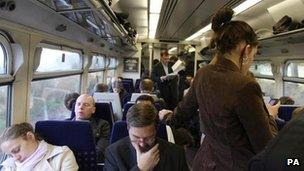Rail overcrowding in London and South East 'gets worse'
- Published

More than 530,000 rail passengers arrived in London during each morning rush-hour in 2011
Overcrowding on rush-hour trains in London and south-east England continues to worsen despite extra investment in railways, government figures show.
The level of overcrowding on peak-time trains to and from London rose from 3.0% in 2010 to 3.2% last year, the Department for Transport (DfT) said.
Southern and Southeastern Trains are running extra services to cope with extra demand during the Olympic Games.
Train providers say they now operate 20% more trains than 15 years ago.
A spokesman for train operating body Atoc said: "Faster trains and better services are attracting record numbers of people to the railways, but the flip side is overcrowding, and we understand passengers' frustration when they can't get a seat."
Evening overcrowding rise
Nearly 200,000 extra peak-hour seats are planned, and Atoc says more flexible franchises in the future should enable rail firms to allocate them where they are most needed.
Rail Minister Norman Baker said: "The figures show why we are right to tackle overcrowding on our railways.
"We will shortly set out our plans for investment in 2014-19."
<link> <caption>The DfT figures</caption> <url href="http://assets.dft.gov.uk/statistics/releases/rail-passenger-numbers-and-crowding-on-weekdays-2011/rail-passengers-crowding-2011.pdf" platform="highweb"/> </link> reveal more than half a million people arrive in London by train in the morning peak - 4% above the official capacity and roughly the same level of overcrowding as in 2010.
Because the return journeys are spread out, the evening rush-hour exodus involves about 90,000 fewer people, but the level of overcrowding on those journeys has risen sharply from 1.9% to 2.3%.
Major rail projects in London are under way, including the Crossrail link across the city, and a high-speed route to the Midlands and northern England is planned.
An initial £6bn high-speed rail link from London to Folkestone, which was completed in 2007, has improved journey times to Europe but <link> <caption>is being used by fewer passengers than expected</caption> <url href="http://www.bbc.co.uk/news/uk-17525872" platform="highweb"/> </link> .
<link> <caption>Southern Railway is providing extra late-night services</caption> <url href="http://www.bbc.co.uk/news/uk-england-18675521" platform="highweb"/> </link> and extra off-peak carriages between London and the Sussex coast during the Olympic Games, which start later this month.
<link> <caption>Southeastern has had to make significant timetable changes</caption> <url href="http://www.bbc.co.uk/news/uk-england-18576953" platform="highweb"/> </link> , including drastic alterations to high-speed services, to cope with the different demands during the Olympics.
- Published15 March 2012
- Published22 November 2011
- Published11 August 2011